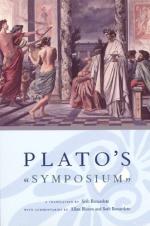|
This section contains 646 words (approx. 2 pages at 400 words per page) |

|
Symposium Summary & Study Guide Description
Symposium Summary & Study Guide includes comprehensive information and analysis to help you understand the book. This study guide contains the following sections:
This detailed literature summary also contains Topics for Discussion and a Free Quiz on Symposium by Plato.
Apollodorus tells the story of a drinking party or symposium that occurs long ago. Socrates and Aristodemus go to a party given for Agathon, since Agathon has just won a contest for the performance of his tragedy. The men there talk and drink and then decide that each should give a speech in praise of the god, Love.
Phaedrus first gives a speech. He tells about the courage that a lover and his beloved have when they are going to battle together. Phaedrus gives the example of Achilles, who avenges his lover, Patroclus, though Achilles knows it will lead to his own death. Next Pausanius gives a speech and suggests conditions for a successful relationship between the lover and the beloved. He says that the relationship must focus on developing the personality and the mind of the beloved, the boyfriend. Relationships purely for physical gratification are wrong, although a boy who enters into such a relationship may do so believing it is to develop his mind. In this case, it is not the boy's fault. To get the higher level of relationship, the lover is socially encouraged, but the boy is socially discouraged to fall in love.
Aristophanes, the famous author of plays is supposed to speak next but has the hiccups; therefore, the next speech is that of Eryximachus, the doctor. Eryximachus says that the practice of medicine is governed by the god of Love. Love governs the way the body reacts and is regulated. If someone has diseases, whether they recover or not is also affected by love and love's effect on the body. A doctor encourages and gives love to what is healthy in a patient and discourages what is unhealthy. What is unhealthy in the patient is due to the wrong type of love. Then, Aristophanes tells a story that in the beginning, man is a creature of four legs with one head and two faces opposite each other. These creatures are a double male, a double female, or a male, female creature. The gods split them in two because they are too troublesome. Now the two halves want to reunite again, and that is the source of human love.
Socrates tells the lesson about love that he learned from the woman named Diotima. Socrates asks the same questions to Diotima in the story he tells, as Socrates has just asked Agathon. If love is not beautiful, does that mean it has to be ugly? Diotima tells Socrates that Love is the child of the god, Resource and the spirit, Poverty. Love is poor and tough, but it schemes to succeed and get the object of love. The purpose of love is to reproduce. Lesser men reproduce with women and have children. Intellectual men reproduce their ideas in younger men by dialogue, as Socrates does. Great men write laws and win battles, and become the "father" of their country, through love. As Socrates ends his speech, Alcibiades comes running into the house, drunk. He sees Socrates, and Alcibiades give a speech on the truth about Socrates.
Alcibiades claims that Socrates has assaulted him and mentally abused him. Alcibiades says that Socrates bewitches and seduces people with his speeches, like a seductive flute playing music. Socrates spends time around boys and young men and is excited by them, says Alcibiades. Socrates comes on by saying that he knows nothing, but this is all an act. Socrates really doesn't care if someone is beautiful or rich. Inside his mind, Socrates is beautiful and full of wonderful ideas. So Alcibiades gets the idea of having Socrates seduce him, and in that way, make Socrates his own. Alcibiades brings Socrates home and tries his best but fails to seduce or be seduced by Socrates. The party ends in disorder, and the next morning Socrates is still engaged in dialogue with other men.
Read more from the Study Guide
|
This section contains 646 words (approx. 2 pages at 400 words per page) |

|



